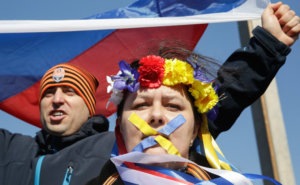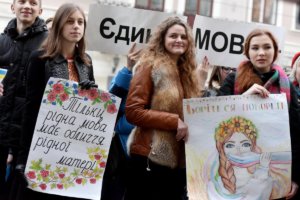On Nov. 9, the nation celebrated the Day of Ukrainian Writing and Language. This year, politicians and government officials reported happy achievements.
But it all looked like just part of the 2019 presidential election campaign.
Thanks to language quotas required by parliament in 2016, Ukrainian songs now prevail on national radio stations, the Ukrainian language dominates in prime time on the six major national TV channels, most of the books are being published in Ukrainian and almost all cinema movies are translated into Ukrainian, according to the results of survey by Space of Freedom civic movement published on Nov. 8.
Is this good news?
If it had happened some 20 years ago, I would have definitely said yes. But now, I’m not sure. I have seen too many times how the Ukrainian or Russian language was used in our country by politicians to manipulate people’s minds. For decades, I was among those manipulated.
In 1996, I was 15 and I remember watching the fierce debate in parliament when lawmakers were arguing which language would receive official status in Ukraine’s Constitution. In the end, the Ukrainian language became the state one with Ukraine being obliged to protect Russian and other languages of national minorities.
I wasn’t happy with this formulations. As a Ukrainian-speaking person, I thought that Russian shouldn’t have special mention at all. Most Russian-speaking Ukrainians probably thought Russian should have a higher status. But it was a compromise.
In 1994, I was crying when I discovered that Leonid Kuchma was elected as president because Kuchma was seen as a pro-Russian candidate and promised to give the Russian language official status. After inauguration, Kuchma forgot about his promise. Like any president, he wanted to rule the entire country, not just part of a divided Ukraine. He simply understood that any changes in the shaky language compromise would bring a new divide.
Viktor Yanukovych, after election as president in 2010, also forgot about his promises to give official status to Russian. A Ukrainian speaking Viktor Yushchenko also didn’t try to change a language status quo in favor of Ukrainian after being elected as president in 2004.
Change of the status quo
In the Ukrainian political debate, the language topic is a weapon. It was first used in June 2012, when parliament gave higher status to the Russian language, triggering debates and street fights. After that, local councils were able to give Russian the status of a regional language and officially use it in their regions.
This law, unofficially called the Kivalov-Kolesnichenko bill — the last names of the lawmakers from Party of Regions who sponsored it — outraged me and, I’m sure, many Ukrainian-speaking Ukrainians. But they definitely helped Party of Regions to win the parliamentary elections in autumn 2012.
In winter 2014, an attempt of parliament to repeal this bill outraged Russian-speaking Ukrainians in the east and south and was widely exploited by Kremlin propaganda. Although then-acting President Oleksandr Turchynov decided not to sign the bill, it was already too late.
I remember dozens of men and women standing at Russian-backed rallies and checkpoints in Donbas and Crimea claiming that they were defending the right to speak Russian which the new authorities allegedly tried to deny.

Pro-Russian demonstrators hold a rally in Donetsk, claiming they are not allowed to freely speak Russian language on March 8, 2014. (Kostyantyn Chernichkin)
New language game
Now a new language law promoting Ukrainian is under discussion in parliament. It was passed in the first reading in early October, about six months ahead of the next presidential elections and a year before the parliamentary ones.
For now, only some 30 percent of newspapers and magazines are being published in Ukrainian. But the new law will oblige all printed media to shift into Ukrainian or have a similar version in Ukrainian with the same size and content.
The new law will force news organizations to print fewer copies or abandon print altogether. It threatens newspapers published in other languages, such as the English-language Kyiv Post. The Kyiv Post cannot afford to double its print run or pay for the translation of all of its content into Ukrainian. There are 207 newspapers published in Ukraine in a language other than Russian or Ukrainian.
Political gains
Some lawmakers expect the new law to be passed by the end of this year. Will it outrage Russian-speaking Ukrainians? Of course it will, and not only them. Will it create problems for pro-Russian politicians? Quite the reverse!
The new law will only deepen the divide by language. In everyday life, this divide is not so important. According to a poll by Razumkov Center conducted in 2017, 68 percent of the nation called Ukrainian their mother tongue, 14 percent said it was Russian and 17 percent of people described both languages as native to them.
In my experience, most Ukrainians freely speak both languages and almost the entire nation understands both of them.
But when big power is at stake and the nation is disappointed with corruption, poverty and lack of justice, the division of Ukrainians into two camps would be helpful do distract them. President Petro Poroshenko likely knows this well. His election motto “Army, language, faith” highlights this division.
For Poroshenko, the best competitor in the second round of the presidential elections would be an openly pro-Russian candidate. Then the president will most likely win. For a pro-Russian candidate, let’s say Yuriy Boiko, this scenario will not bring the presidency. But it will be a perfect start for his parliament campaign and will definitely give his party more seats, if not the majority, in the next parliament. So Poroshenko and his pro-Russian competitor will soon receive another way to deepen the divide.
“Faith” is also part of Poroshenko’s re-election slogan. With the recognition of a united Orthodox Church of the Kyiv Patriarchate, millions of Ukrainians will have to choose between the national one and the Moscow branch. And the hard choice between these two churches will create additional divide.
My only hope is that the third point in Poroshenko’s election motto “army” will not be used to divide because it’s too dangerous for a country at war.

Activists hold banners in support of Ukrainian language during a rally held on Nov. 9, 2017, in Lviv. (UNIAN) (source)
More patriotic, less educated
Research by Space of Freedom showed one more interesting trend. While 76 percent of books published in Ukraine this year were in Ukrainian, the total number of published books has decreased in recent years. Ukrainian books still prevail because of the absence of competition, since Ukraine restricted the import of books from Russia in 2017.
I liked the idea to grant tax preferences for publishing of Ukrainian books imposed in 2015. I thought it would increase not only their quantity but also quality. But I think the ban on the imports of books, except for the openly propagandistic ones, will only decrease the education level of the nation. Perhaps the political elite is more interested in making the people less smart so they can be more easily ruled.
I have a choice. I can find books in English. Very few of them are sold in Ukraine, but I can buy them abroad. But this is not an option for most of the country. Ukraine ranks 28th among 32 countries in Europe in the level of English, according to EF English Proficiency Index. Russia is one step above us. Belarus is five steps above.
Another big achievement, according to many Ukrainian language advocates, is the dubbing of almost all movies in Ukrainian. But if we used just Ukrainian subtitles in the movies screened in cinema or on TV, like in many European countries, it would definitely improve the English language knowledge for many Ukrainians.
When I received my national passport in 1998, I didn’t like it. I was appalled that my data was written in it not only in Ukrainian but also in Russian. This bilingualism doesn’t bother me anymore. But I wish someday our passport will equally have the data in English. This would show that Ukraine is becoming more modern and global, instead of being divided by language or religion — the issues which bothered Europe 100 years ago.
